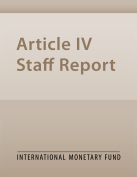Ireland: Twelfth Review Under the Extended Arrangement and Proposal for Post-Program Monitoring

Release Date: © December, 2013
ISBN
: 978-1-48431-236-0
Stock #: 1IRLEA2013005
English
Stock Status: On back-order
Languages and formats available
| English | French | Spanish | Arabic | Russian | Chinese | Portuguese | |
| Paperback | Yes | ||||||
| Yes | |||||||
| ePub | Yes | ||||||
| Mobipocket | Yes |
Description
KEY ISSUESSteadfast policy implementation has been maintained through the final review ofthe program. Budget execution has once more been solid in 2013, with the fiscal deficitexpected to remain within the Excessive Deficit Procedure ceiling. Budget 2014 targets abalanced adjustment path, with a primary balance in 2014 and an overall deficit below3 percent of GDP in 2015. Efforts continue to address the high level of nonperformingresidential mortgages and SME loans and key bank diagnostics have been completed.Ireland has pulled back from a severe banking crisis with the support of theEU-IMF arrangements and broader European initiatives. Though below initialprojections, growth has exceeded the euro area average and indicators suggest arecovery may be emerging. Banking reforms have supported financial stability. While thecrisis and bank support led to a substantial rise in the deficit and a sharp increase inpublic debt, phased consolidation—initiated prior to the Fund arrangement butsubsequently maintained—has significantly improved the fiscal position. Market accesshas been regained, also benefitting from EFSF/EFSM maturity extensions, the PromissoryNotes transaction, and the broader easing in euro area market tensions.Continued determined policy implementation is nonetheless needed on a range offronts before Ireland can be judged to have fully recovered from the crisis: Steady fiscal consolidation. With the fiscal deficit still high and public debt veryelevated, sizable further consolidation is needed in coming years to put debt firmlyon a declining path and help ensure Ireland’s return to market financing is lasting. Addressing mortgage arrears and completing bank repairs. Very slow progress inaddressing mortgage arrears hinders a revival over time in lending that is needed fordomestic demand recovery to become sustained. Intensified efforts are needed toensure banks and mortgage borrowers in arrears conclude durable solutions. Banksalso need to rebuild their profitability, although, in the context of low ECB policyrates, they face challenges from the structure of their assets. Reducing high unemployment. Efforts to improve employment services shouldcontinue, especially for the long-term unemployed, to ensure that they remain in theworkforce and acquire marketable skills.After wide consultation, the Irish authorities have decided to not seek a financingbackstop after the conclusion of their current EU-IMF arrangements. Irelandconcludes its Fund arrangement in a much strengthened position and the authoritiesintend to press on with addressing the significant challenges that remain. Nonetheless,continued European support, especially during Ireland’s transition to the SingleSupervisory Mechanism and the banking union, remains important.
Taxonomy
Balance of payments , Current account , General resources account , IMF Finance , IMF governance and operations
More publications in this series: IMF Staff Country Reports
